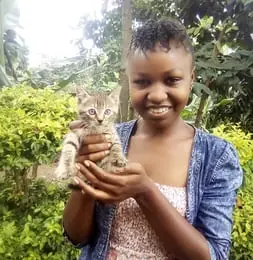
A kitten will become less affectionate if they:
- Are treated harshly
- Stay alone for a long time
- Are a shy personality or breed
- Don’t feel well
You can raise an affectionate kitten by playing with them, cuddling, and holding them often to earn their trust. Avoid scaring your kitten.
Watching your kitten grow from a tiny helpless creature to a fully grown furry cat is a wonderful thing. During this time, a lot of physical and personality changes are expected.
We are all familiar with the popular internet meme of a grumpy cat with “cattitude.” Granted, having a cranky kitten is not what you have in mind for your fur baby.
You want to raise a sweet friendly kitten. This article answers the question if your kitten will be less affectionate, and what can cause it to be that way.
Kitten behavior may change when your kitten is between 1 year and 18 months. Although a 1-year-old cat is no longer considered a kitten, it may still exhibit childish behaviors like being too playful.
Developmentally speaking, your kitten looks grown, but kitten adolescence lasts until they reach 18 months.According to the Raising Happy Kittens chart, at this age, they may become less affectionate.
Some cat owners say that when a kitten reaches 7 months they are in a teenage phase, and become more self-conscious and a bit more independent.
There is nothing to worry about though. By age 2, your furry friend will fully mature, and take on its adult personality.
Factors That Determine their Level of Affection
1. Background
Kittens raised with people during the first 4 months of their lives tend to be more affectionate. Feral kittens had no human interaction during this time which explains why they are less affectionate, and scared of people.
2. Personality
Personality also plays a role. Some kittens are withdrawn and might only be comfortable around one or two people. Others are the socialite that likes to hang around just anyone.
3. Breed
Breeds such as the Ragdoll and Burmese are considered the friendliest cat breeds. The Scottish fold, the British shorthair, and the Russian Blue are laid back breeds.
4. Health problems
Felines are very good at hiding their signs of illness and pain. Sometimes being quiet and withdrawn is a sign that your kitten is not feeling well.
Cats that are sick will often have a change in overall energy and sociability. These changes should be enough warning signs to take your kitty for a medical checkup at the vet.
Factors That Make a Kitten Less Affectionate

Just like human babies, kittens have different characters. Yet, as cat owners, we play a huge role in shaping our kitten’s personality.
They might either become cuddly and affectionate or shy and withdrawn, depending on how we treat them, and the environment we expose them to.
If you are worried that your kitten will become less affectionate, let us consider these factors that can be the reasons why your kitten grows into a less affectionate cat.
1. Growing up in a hostile environment
Talk to any animal shelter staff and they will tell you how kittens brought in there come from difficult situations. Some were picked up from the streets, and had to endure harsh weather and bullying from animals.
Others have bad past experiences with humans such as being hit, and such abuse can cause trauma to a kitten.
2. Harsh punishment
No matter how cute our little ones look, they sometimes engage in behaviors that most of us find upsetting.
Your kitten might decide to claw on your expensive curtains, scratch furniture, knock down glasses, and bite your feet as you sleep.
Kittens have a high level of energy and any slight movement incites them into a ‘play mode.’ Their playful and curious nature always gets them into trouble.
But there is no justification for harshly punishing your kitten when they engage in destructive behavior.
By harsh punishment, we mean actions like shouting at your kitten or hitting them. Your former loving kitten can become less affectionate and even afraid of you, if you treat it that way.
Furthermore, you can’t punish a kitten for being a cat. To them, these are normal behaviors. They won’t understand what they are doing is wrong.
3. Leaving it alone for too long
Your kitten thrives on constant human interaction. They enjoy the times they spend sitting on your lap as you watch TV, or playing with them their favorite game.
Don’t leave your kitten alone for too long. They could become lonely and thus less affectionate, because the bond between the two of you draws apart each day.
When your kitten lacks physical stimulation, they get bored and will show little excitement when around you.
4. Sudden changes in the household
Cats, in general, like routines and changes can cause your kitten great distress. Let’s just say anything that makes your kitten scared is a recipe for a less affectionate feline.
If you have moved to a new home, your kitty may find it hard to adjust to the new surroundings. They can stay reserved and disinterested in many things.
New family members or even pets can scare your kitty, and make it less friendly. They may choose to retreat to a certain corner of the room each time the new family member is present.
Dogs sometimes get along with kittens, but if your dog is a bully it can cause great distress to your kitty. This fear makes them withdrawn and avoid people.
How to Raise an Affectionate Kitten

Every kitten can become affectionate. It just needs a little more effort and patience on your part.
Perhaps you crave for the moment when your kitten will curl up on your lap, or purr against your chest as you relax. It’s a moment of pure peace.
Raising an affectionate kitten all starts with handling it frequently, playing, and spending a lot of time together.
1. Handle your kitten frequently
It is never too early to start handling your kitten. The sooner you handle them, the greater chance of raising an affectionate kitty.
Especially if your kitten is a former feral or street feline, you need to shower it with lots of love and attention to tame them.
It’s easier to tame these at around 4 to 8 weeks. At this age, your kitten has just been weaned from its mother, and starts to discover its personality as it interacts with its siblings.
The more it grows, the harder it will be to tame a former feral kitten, no matter how much handling you do.
Your kitten is forming new relationships, so be sure they have a positive impression of humans.
As you hold your kitten, practice being gentle. Don’t squeeze it too tight. Children should be taught how to handle a kitten gently, and not by the scruff or pulling its ears.
2. Pet and play with your kitten
Petting your kitten is a nice way to bond with them. It is also enjoyable and pleasing to them. You will notice that as you pet your little one, they purr to show you how happy they are with what you are doing.
When your kitten gets accustomed to petting, they learn that it is pleasurable and rewarding. Another advantage is that your kitten will be less fussy when it comes to going to the vet, being groomed, or trimming its nails in the future.
Every cat has sensitive body parts that they don’t like being touched. Watch out if your kitten shows signs of displeasure, such as loud meowing or pulling back when petting them.
These are useful tips for petting your kitten to ensure the process is enjoyable for both of you:
3. Sit down at its level
When you are at eye level, your kitten feels more comfortable around you. Standing up will make you appear menacing. Crouch on the floor or sit down on a chair.
At this position, you can lure it with toys or treats, but they will almost always come to you.
4. Let the kitten smell your hands
Scents are important tools of communications in the feline world. Once your kitten gets used to your scent, it marks you as a member of its tribe, thus strengthening the bond between the two of you.
Ensure the kitten is relaxed and calm before reaching out with your hand. You don’t want it to end up with it biting or scratching you.
Pet your kitten in areas they use to mark scents, such as the base of their chin, ears, tail, and cheeks.
Most kittens enjoy being rubbed under the chin. Use your fingertips to rub or scratch them under the chin.
Petting also provides you with fine opportunities to play with your furry friend. This can include chasing a weather band, laser point, or any other interactive game that they enjoy.
4. Earn their trust
The best way to earn your kitty’s trust is by respecting its personal space. If your kitten is non-affectionate, don’t be discouraged. Stay calm and avoid being pushy, and let them come to you on their terms.
The feline then starts to associate you with good things.
